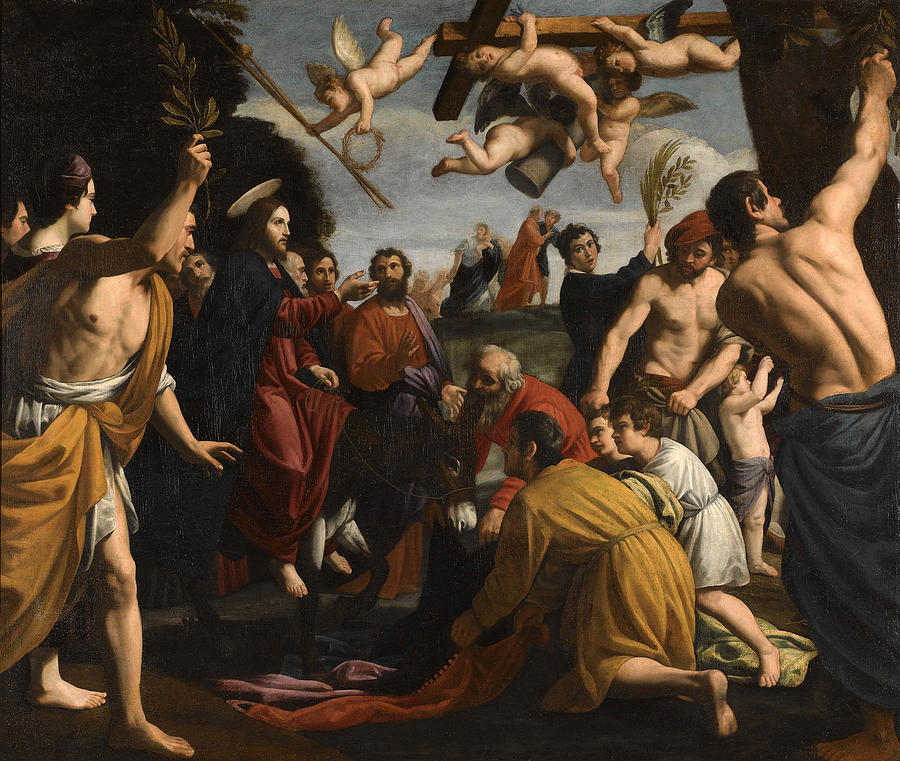The celebration of Palm Sunday or Palm Sunday of the Passion begins the Church’s entry into Holy Week, the period that will culminate in the three sacred days of Holy Thursday, Good Friday, and Holy Saturday, when the great mysteries of our salvation are celebrated.
The Gospel antiphon speaks of Jesus as the one who is “obedient to the point of death.” Jesus’ whole life is an expression of his obedience to the will of the Divine Father. It is this obedience that marks the life of the Christian and in Jesus’ case, the will of the Father brings him up to the City of David where prophets go to die. (Luke 13:33)
Following the prophecies of Zechariah, Jesus rides, as a king, into the city on a donkey. One that he has to borrow! And he will later die for the people. In fact, the first reading of the Mass is one of the Suffering Servant Songs from the Prophet Isaiah.
The words: “I gave my back to those who beat me, my cheeks to those who plucked my beard; my face I did not shield from buffets and spitting,” are chilling, given what is to happen on the coming Friday. He has become completely vulnerable, like the weakest human being.
The psalm-response to the first reading is Psalm 22, whose first words – “My God, my God, why have you forsaken me?” – Jesus cries from the Cross. Sad as the beginning of the psalm is, the words about the suffering of the just man, end with his celebration: “I will proclaim your name to my brethren; in the midst of the assembly I will praise you.”
There will be resurrection. Death will be overcome. Death does not win.
Subsequently, Saint Paul announced to the Philippians (Second Reading): “God greatly exalted him and bestowed on him the name which is above every name, that at the name of Jesus every knee should bend, of those in heaven and on earth and under the earth, and every tongue confess that Jesus Christ is Lord.”
In Jesus, the circle is complete. Through a man (Adam), the entire human race was forever tainted by sin; and through a man, humanity is restored, and more than restored. We, through Him, are exalted.

Jesus becomes Lord of All. And the whole wondrous history is “for the glory of God the Father.” (Second Reading) The world becomes the monstrance for the risen glorified Son so that all of Creation properly renders the Father glory through the Risen Lord. This is the marvelous fruit of his obedience. Our lives will be fruitful to the degree that we too are obedient to His will.
Customarily, at the beginning of Passion Week, the Church reads the account of the Passion from one of the first three Gospels. The Passion in the Gospel of John is reserved for the service on Good Friday. This year, the Church reads the Passion in the Gospel of Luke.
The account starts with the Last Supper, another step in Jesus’ walking with us as he builds the Church. He does something amazing: he announces that the bread offered at the meal has become His Body for us. He is becoming our food.
Then, the wine that is offered becomes His Blood shed for us. After the meal, He prophecies that He will be betrayed and that He will confer a kingdom on those who stand by Him.
The rest of the Passion unfolds through wrenching scenes: Peter’s betrayal; Jesus’ agony in the garden; Jesus’ trial before the powers of both the kingdom of Israel and the Roman authorities; the meeting with the women of Jerusalem; the crucifixion between the two thieves.
The one thief strikes the only uplifting note other than Jesus’ faithful living out of the life of “the Suffering Servant.” The thief realizes just who he is meeting. He repents and “will be with [Jesus] in Paradise.”
So from that hill outside Jerusalem, there echoes the promise of forgiveness, the promise of Paradise, down through the centuries. This is why this man who is also God, came and walked among us.
With all of his holiness, he ate with sinners. He came to be the presence of holiness among sinners, just as the Church has been ever since.
The great paradox is not that holiness is unapproachable in some merciless fashion, but rather that this holiness is present in the midst of all the sinfulness, to take it up and destroy it with overwhelming love. The Church does not shrink from reaching out to the poor and the suffering.
Speaking of Paradise, Pope Benedict reminded us “the Cross itself is the true tree of life. We do not find life by possessing it, but by giving it. Love is a gift of oneself, and for this reason it is the way of true life symbolized by the Cross.”
*Image: The Triumphal Entry of Christ in Jerusalem by Alessandro Turchi (and studio), 1578 [private collection]














